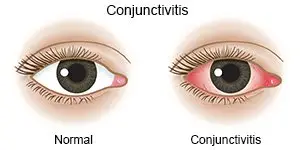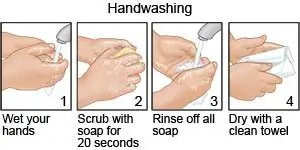What is conjunctivitis?
Conjunctivitis, or pink eye, is inflammation of your conjunctiva. The conjunctiva is a thin tissue that covers the front of your eye and the back of your eyelid. The conjunctiva helps protect your eye and keep it moist.
 |
What causes conjunctivitis?
The most common cause of conjunctivitis is infection with bacteria or a virus. Allergies or exposure to a chemical may also cause conjunctivitis. Conjunctivitis is easily spread from person to person.
What are the signs and symptoms of conjunctivitis?
You may have symptoms in one or both eyes. You may also have other general symptoms, including a sore throat, runny nose, or fever. You may have any of the following:
- Redness in the whites of your eye
- Itching in or around your eye
- Feeling like there is something in your eye
- Watery or thick, sticky discharge
- Crusty eyelids when you wake up in the morning
- Burning, stinging, or swelling in your eye
- Pain when you see bright light
How is conjunctivitis diagnosed?
Your healthcare provider will ask about your symptoms and medical history. Tell the provider if you have been around anyone who is sick or has pink eye. Your provider may ask if you have allergies or wear contact lenses. You may need any of the following:
- A visual acuity test checks your vision in both eyes. You will be asked to read letters and numbers from a chart.
- An eye exam may help your provider find out what is causing your conjunctivitis. Your provider will look at your eyes, eyelids, eyelashes, and the skin around your eyes. You will be asked to look in different directions. Your provider may gently press on your eye or eyelid to see if there is drainage. Your provider may gently swab your conjunctiva with a cotton swab and send it to the lab for tests.
- A slit-lamp exam may show a cut, scratch, or other damage to your cornea. This exam may also show a foreign object in your eye. A microscope with a bright light is used to check every part of your eye. A dye called fluorescein may be used.

How is conjunctivitis treated?
Your conjunctivitis may go away on its own. Treatment depends on what is causing your conjunctivitis. You may need any of the following:
- Allergy medicine helps decrease itchy, red, swollen eyes caused by allergies. It may be given as a pill, eye drops, or nasal spray.
- Antibiotics may be needed if your conjunctivitis is caused by bacteria. This medicine may be given as a pill, eye drops, or eye ointment.
Treatment options
The following list of medications are in some way related to or used in the treatment of this condition.
- Lotemax
- Alrex
- Kenalog-40
- Zymar
- Maxidex
View more treatment options
How can I manage my symptoms?
- Apply a cool compress. Wet a washcloth with cold water and place it on your eye. This will help decrease itching and irritation.
- Use artificial tears. This will help lessen your symptoms, including itching or irritation.
- Do not wear contact lenses until treatment is complete and your symptoms are gone.
- Flush your eye. You may need to flush your eye with saline to help decrease your symptoms. Ask for more information on how to flush your eye.
How do I prevent the spread of conjunctivitis?
- Wash your hands with soap and water often. Wash your hands before and after you touch your eyes. Wash your hands after you use the bathroom, change a child's diaper, or sneeze. Wash your hands before you prepare or eat food.

- Avoid contact with others. Do not share towels or washcloths. Try to stay away from others as much as possible. Ask when you can return to work or school.
- Avoid allergens and irritants. Try to avoid the things that cause your allergies, such as pets, dust, or grass. Stay away from smoke filled areas. Shield your eyes from wind and sun.
- Throw away eye makeup. Bacteria can stay in eye makeup. Throw away your current mascara and other eye makeup. Never share mascara or other eye makeup with anyone.
When should I seek immediate care?
- You have worsening eye pain.
- The swelling in your eye gets worse, even after treatment.
- Your vision suddenly becomes worse, or you cannot see at all.
When should I call my doctor?
- Your start to notice changes in your vision.
- You develop a fever and ear pain.
- You have tiny bumps or spots of blood on your eye.
- You have questions or concerns about your condition or care.
Care Agreement
You have the right to help plan your care. Learn about your health condition and how it may be treated. Discuss treatment options with your healthcare providers to decide what care you want to receive. You always have the right to refuse treatment. The above information is an educational aid only. It is not intended as medical advice for individual conditions or treatments. Talk to your doctor, nurse or pharmacist before following any medical regimen to see if it is safe and effective for you.© Copyright Merative 2023 Information is for End User's use only and may not be sold, redistributed or otherwise used for commercial purposes.




